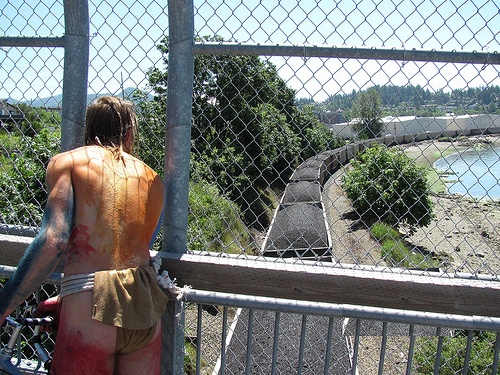By Carol Pierson Holding
It took just three days after the Canadian oil train explosion for Keystone XL pipeline supporters to shift the news from rail safety to use this tragedy to further their goal. Apparently, the practice of using disasters as promotion is still strong. PR writes itself: “Save lives, build the pipeline!”
On Wednesday, I woke to the Seattle Times headline “Canadian blast revives worries about transporting oil by rail” above a full page story picked up from Bloomberg News. The story was purportedly about unsafe rail tankers, but shifted direction in the very first sentence, blaming the explosion in part on the delay in pipelines such as the TransCanada Keystone XL.
Bloomberg is first and foremost a business news service, so the pro-business angle is understandable. But this story ran in on page 3 of the Seattle Times’ main business section, in the news analysis section called “Close Up.” It was a straight news report.
Isn’t it astonishing that within just three days of the explosion, mainstream press was already blaming the deaths on pipeline delays.
The pipeline delay thread almost threatens to overwhelm the issue of rail safety. The New York Times noted that the tankers were found to be unsafe 20 years ago. They were supposed to have been replaced. Fifty lives could have been saved. Another horrifying tragedy that was preventable had the rules been followed. It happens.
But what stopped me cold was that the New York Times claimed that the explosion came as such a “big surprise.”
And that’s the real point. It’s almost impossible to predict or prepare for the worst case when you’re dealing with a toxic substance. I’m reminded of the 1961 Colorado River disaster caused by flushing out gutters that had accumulated years of insecticides, releasing tons of toxins all at once. Rachel Carson eloquently describes what happened next in her seminal work Silent Spring:
“ …(on Sunday, January 15) dead fish appeared mysteriously in Town Lake in Austin and the Colorado River for a distance of about 5 miles below the Lake. None had been seen the day before. On Monday there were reports of dead fish 50 miles downstream. By this time it was clear that a wave of some poisonous substance was moving down in the river water. By January 21, fish were being killed 100 miles down stream, … and a week later, the chemicals were doing their lethal work 200 miles below Austin.”
When dealing with and especially transporting dangerous, toxic substances, there will always be unintended consequences. With all this press analysis of the oil “surprise,” I wonder why no-one is talking about worst case scenarios for the proposed West Coast coal trains.
Known consequences of coal trains have been much studied. We now have to accept the possibility of the previously unimaginable: a major coal spill into the Salish Sea.
There have already been sixteen coal train derailments this year. One can now have to envision a spill so extreme that an entire train of 115 cars or more each carrying 115 tons of coal could fall into the Sea.
There is no protection from Federal agencies. As reported in Huffington Post last month, the Army Corps of Engineers withdrew from its planned environmental review of coal ports. Given the oil explosion in Canada, shouldn’t they reconsider? No agency regulates the toxins in raw coal, including arsenic, cadmium, mercury, and bottom ash emissions. A major spill could coat the Sea with a black, toxic film that would kill life beneath it. Where is the EPA?
The most important lesson from the oil tank explosion is not the additional proof that oil tanks are unsafe or whether it’s safer to transport via oil train or pipeline. Both are potentially lethal. The real issue is that when it comes to dangerous, toxic material, the one thing you never thought could happen does happen. It’s one thing to accept those risks when shipping a critical fuel to Americans. The benefits outweigh the risks, at least for now. It’s quite another to accept that risk to ship fuel to Asia – especially when the resulting coal pollution blows right back on us.
Photo courtesy of theslowlane via Flickr CC.
 Carol Pierson Holding writes on environmental issues and social responsibility for policy and news publications, including the Carnegie Council's Policy Innovations, Harvard Business Review, San Francisco Chronicle, India Time, The Huffington Post and many other web sites. Her articles on corporate social responsibility can be found on CSRHub.com, a website that provides sustainability ratings data on 7,400 companies worldwide. Carol holds degrees from Smith College and Harvard University.
Carol Pierson Holding writes on environmental issues and social responsibility for policy and news publications, including the Carnegie Council's Policy Innovations, Harvard Business Review, San Francisco Chronicle, India Time, The Huffington Post and many other web sites. Her articles on corporate social responsibility can be found on CSRHub.com, a website that provides sustainability ratings data on 7,400 companies worldwide. Carol holds degrees from Smith College and Harvard University.
CSRHub provides access to corporate social responsibility and sustainability ratings and information on 7,400+ companies from 135 industries in 96 countries. By aggregating and normalizing the information from 257 data sources, CSRHub has created a broad, consistent rating system and a searchable database that links millions of rating elements back to their source. Managers, researchers and activists use CSRHub to benchmark company performance, learn how stakeholders evaluate company CSR practices and seek ways to change the world.

